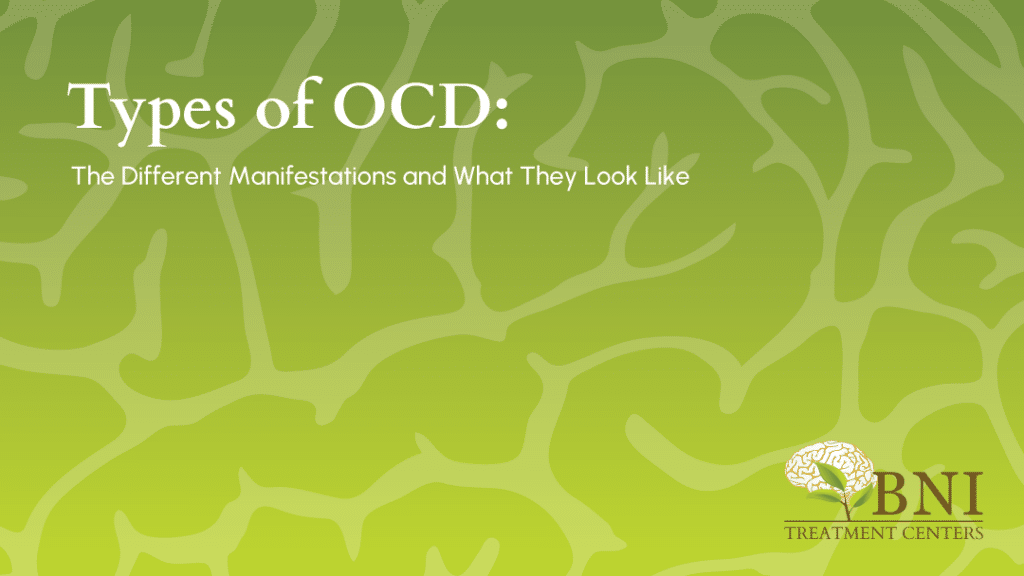1% to 3% of adolescents have obsessive-compulsive disorder (OCD). This condition usually manifests in childhood and adolescence. It’s vital to recognize what it looks like. …
Types of OCD: The Different Manifestations and What They Look Like

1% to 3% of adolescents have obsessive-compulsive disorder (OCD). This condition usually manifests in childhood and adolescence. It’s vital to recognize what it looks like. Early detection and intervention in the teen years can prevent significant distress in adulthood.
OCD appears in multiple ways, some of which aren’t widely known. These lesser-known types of OCD may lead individuals to overlook something that requires professional help. Raising awareness of them also helps us understand OCD, and teens diagnosed with it, on a deeper level.
At BNI Treatment Centers, our psychiatrists are familiar with varying types of OCD, how they present in teens, and the impact this condition can make. We’ll explore these things in this short guide.
Understanding Different Types of OCD and What They Have in Common
OCD is made up of “obsessions” and “compulsions.” Obsessions are intrusive, unwanted, and usually distressing thoughts the individual cannot control. Compulsions are the behaviors the individual engages in to relieve the distress caused by the obsessions.
The DSM-5, used by mental health professionals to diagnose conditions, does mention themes in OCD. It does not break OCD diagnoses up by types of OCD. That means these types are not clinical terms. They simply help us understand the varying ways this condition manifests and impacts people.
Harm OCD
Harm OCD consists of random thoughts of violence or aggression. Many people experience these thoughts from time to time. For people with harm OCD, the thoughts are persistent and disturb them significantly.
Most individuals with harm OCD fear they will act on these thoughts, and take extreme measures to avoid it. For example, a teen may vividly and violently imagine stabbing their mother with a knife. They’ll then go to great lengths to avoid knives. People with harm OCD sometimes believe they are “bad” people for experiencing these thoughts. In reality, they are extremely unlikely to commit acts of violence.
Relationship OCD
People with relationship OCD fixate on their relationships, especially with a romantic partner. They will often perpetually question the quality of the relationship, if they are right for one another, and if they are happy together. They may seek reassurance from their partner or people around them. They may seek it out silently, by comparing their relationship to others or “reliving” memories with their partner in hopes of finding “signs” to answer their questions.

Symmetry and Ordering OCD
Symmetry and ordering OCD involves an obsession with things being perfectly tidy and orderly. Some individuals may also become upset if they don’t complete rituals symmetrically. This could include needing to scratch one ear after scratching the other to maintain a sense of “balance.” These individuals often need to arrange items in a very particular way, and may also complete counting rituals. They also often fear something bad will happen if objects aren’t perfectly organized.
Contamination OCD
Contamination OCD is a common stereotype of those with OCD. It is a “fear of germs,” and these people will often believe they are sick or infected others with an illness when they haven’t. This leads to frequent handwashing, cleaning, and avoidance of areas where significant bacteria may be present. They experience a persistent feeling of dread that they will be exposed to something toxic.
Hoarding OCD
This type of OCD involves a feeling that throwing something away will lead to dire consequences. Hoarding behaviors occur in about 30% of people with OCD. This can include believing that they must collect a certain amount of an item to keep loved ones safe, fear of throwing away something important by accident, and the impulse to buy unnecessary multiples of items. They will also frequently check their possessions, and become distressed when they can’t find something they need.
Taboo Thoughts
Harm OCD technically falls under this category. This type of OCD involves extreme distress over disturbing intrusive thoughts, such as inappropriate sexual or violent thoughts. These people will frequently obsess over their moral standing, and believe these thoughts make them “bad.” This comes with significant guilt and shame, and a fear of “consequences” for their thoughts. Taboo thoughts are not a sign of what the person experiencing them wants. This OCD is born from a deep desire to not act on their intrusive thoughts.
OCD Types vs. OCD Specifiers
While OCD types are not official diagnoses, OCD specifiers are included in the DSM-5. Specifiers indicate how aware someone is that their obsessions are not true or likely to happen. These include:
- With good or fair insight. The individual is aware or suspects that their obsessions aren’t true, even though they are still distressing.
- With poor insight. The individual isn’t sure if their obsessions are true or not, but leans toward believing they are true.
- With absent insight or delusions. The individual is certain their obsessions will come true, despite repeated evidence of the opposite.
- Tic-related. The individual’s OCD symptoms are related to a tic disorder.

Getting Help for OCD in Los Angeles
If any of these types of OCD sound like your teen, it’s time to consider seeking help from a mental health professional. OCD is not a condition either of you can control, and it is not a phase that will go away in time. Teen OCD treatment is available, and countless adolescents have found success with it.
In fact, one study found that 53% of teens who received treatment for their OCD saw at least partial remission. Additionally, we know that co-occurring mental health conditions tend to develop later in life, making early treatment of OCD in teens especially important. With proper care, your teen can heal and live a peaceful life.
BNI Treatment Centers is a mental health center for adolescents in the Los Angeles area. Our psychiatrists are closely involved in every teen’s treatment plan, allowing us to change treatment methods and medication whenever required. They are experts in mental health, capable of diagnosing and treating complex conditions. Could your teen benefit from our help? Call us at (888) 522-1504 today for more information.
BNI Treatment Centers: Science-based, evidence-backed, compassion-led.
About the Author

Arastou Aminzadeh, M.D.
Dr. Arastou Aminzadeh or Dr. A as most teens refer to him, has been working in variety of clinical settings for the last 20 years. He is well respected nationally for his expertise in Addiction medicine and treating adolescents. Dr. A is a triple board certified physician in psychiatry, Child and Adolescent psychiatry and Addiction medicine.

Oliver Ahmadpour, M.D.
Dr. Oliver Ahmadpour is an adult and child psychiatrist with nearly four decades of experience in the field of medicine with an M.D. degree from Sweden, where he practiced as an Internal Medicine physician. In the U.S. he completed his Post-Doctoral Fellowship in Endocrinology at UCSD, and his Residency and Fellowship in Adult, Child, and adolescent Psychiatry at USC Keck School of Medicine.
Free Insurance Verification
News & Resources for Families
Check Out Our Recent Articles
Frequently Asked Questions
We treat a wide range of teen mental health challenges including anxiety, depression, bipolar disorder, OCD, trauma-related disorders, behavioral issues, ADHD, oppositional defiance, substance use, and dual-diagnosis conditions. Many families come to BNI after struggling to find the right level of care elsewhere.
Most private insurance plans cover a significant portion of treatment. Our admissions team verifies benefits quickly and explains coverage, deductibles, and out-of-pocket expectations before admission. We do not accept Medi-Cal or Medicare.
Yes. Many families come to BNI with teens who have complex diagnoses, treatment-resistant depression, severe anxiety, self-harm history, or previous hospitalizations. Our clinical leadership regularly treats high-acuity cases and provides specialized expertise for them.
Absolutely. We use established, research-backed modalities including CBT, DBT, trauma-informed care, psychiatric medication management, experiential therapies, family systems work, and integrative approaches such as mindfulness, yoga, and expressive arts.
Our residential and outpatient programs are located in private, secure homes in Agoura Hills and Calabasas. These areas are known for their safety, privacy, and access to nature—ideal for focused healing and recovery.
Yes. BNI is trusted by the UCLA David Geffen School of Medicine as a training rotation site for physician fellows to learn best practices in adolescent mental health—an acknowledgment of our clinical quality and leadership in teen psychiatry.
What We Treat
Primary Mental Health

Primary Mental Health
Behavioral Issues

Behavioral Issues
Dual-Diagnosis




